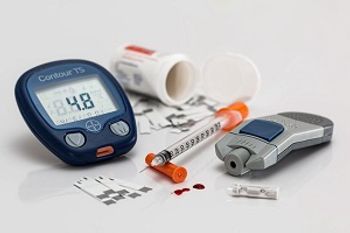
Diabetes
Latest News

Amazon will shut down its telehealth venture Amazon Care by the end of 2022; youth type 2 diabetes (T2D) diagnoses rose by 77% in the first year of the COVID-19 pandemic; officials during Donald Trump’s presidency tried to push for the FDA reauthorization of a discredited COVID-19 treatment.
Latest Videos

More News

This study presents an integrated, exploratory assessment of physical activity, patient activation, health-related quality of life, and clinical outcomes among older adults with type 2 diabetes (T2D) using survey, wellness, and claims data.

HR 5376, or the Inflation Reduction Act, is most significant piece of legislation affecting federal health policy since the passage of the Affordable Care Act in 2010; for Medicare beneficiaries, it caps insulin at $35 a month and includes other pricing reforms.

During the 2022 Congress of the American Society for Preventive Cardiology (ASPC), held in Louisville, Kentucky, Erin D. Michos, MD, MHS, of Johns Hopkins, and Pam R. Taub, MD, of UC San Diego Health, discussed how treatment of diabetes requires going beyond glucose-lowering therapies and including newer medications that offer cardiovascular benefits.

Following a time-restricted eating schedule, limited to a 10-hour window, provides beneficial metabolic effects and the potential for weight loss in patients with type 2 diabetes, according to a new study.

Researchers suggest that annual wellness visits for patients with diabetes lead to earlier diagnoses of complications, preventing amputations and serious consequences.

A recent review found that there were several modifiable and nonmodifiable factors that can affect the treatment adherence of patients with type 2 diabetes (T2D).

A recent study characterized the known association between corticosteroid exposure and type 2 diabetes (T2D), finding risk to be associated with treatment- and patient-related characteristics that can inform prescription of treatment with steroids.

Although prediabetes prevalence jumped 4.8 percentage points from 2010 to 2020, barriers to accessing diabetes prevention interventions persist, driven by cost, eligibility requirements, and data integration, leading to low participation rates.

President Joe Biden will sign an executive order to protect access to the abortion pill and emergency contraception; Governor Gavin Newsom announced California will make low-cost insulin; CMS proposed a rule that would bring major reforms to the accountable care organization program.

Christopher Thompson, MD, MSc, FASGE, FACG, AGAF, FJGES, director of endoscopy and codirector of the Center for Weight Management and Wellness at Brigham & Women’s Hospital, professor of medicine at Harvard Medical School, discusses a session on gastrointestinal (GI) invention at the recent conference, Digestive Disease Week, held May 21-24 in San Diego, California.

Christopher Thompson, MD, MSc, FASGE, FACG, AGAF, FJGES, director of endoscopy and codirector of the Center for Weight Management and Wellness at Brigham & Women’s Hospital, professor of medicine at Harvard Medical School, discusses duodenal jejunal bypass liner treatment and future innovations in gastroenterology.

Data from menstrual tracking apps may be used against people in certain states if Roe v Wade is overturned; 100 million Americans, including 41% of adults, have health care debt; Express Scripts reported results of its program to lower diabetes-related costs.

Researchers found significantly higher incidence rates of of type 2 diabetes (T2D) in children with nonalcoholic fatty liver disease compared with other groups.

About 3 times as many of the children and teenagers taking dulaglutide had a glycated hemoglobin level of less than 7.0% at 26 weeks compared with those on placebo.

Results of a cross-sectional study revealed wide disparities in emergency department (ED) use among patients with diabetes between 2008 and 2017.

Results of a randomized controlled trial found supplementation with vitamin D among those at risk for type 2 diabetes (T2D) did not prevent onset of the disease.

Findings of this study showed arterial stiffness is associated with a higher risk of diabetes onset compared with hypertension.

New findings from a prospective cohort study outline associations between diabetes medications and common eye conditions, such as open-angle glaucoma and age-related macular degeneration (AMD).

Marc-Andre Cornier, MD, professor and director of the Division of Endocrinology, Diabetes and Metabolic Diseases at the Medical University of South Carolina, explains trends he expects to see in upcoming diabetes and weight loss studies.

The Amputation Reduction and Compassion Act (H.R. 2631) would ensure that Medicare and Medicaid both cover peripheral artery disease screening for at-risk beneficiaries without the cost-sharing requirements that could make some patients balk at seeking care.

The treatment was found to improve glycemic control and is indicated to be used in conjunction with diet and exercise.

Marc-Andre Cornier, MD, professor and director of the Division of Endocrinology, Diabetes and Metabolic Diseases at the Medical University of South Carolina, discusses the importance of a combined approach to weight loss.

Black, Asian, and Hispanic adults in the United States were found to have an increased risk for developing diabetes at lower weights and younger ages compared with White Americans, suggesting that screening recommendations for the disease should be altered to reflect this difference.

Marc-Andre Cornier, MD, professor and director of the Division of Endocrinology, Diabetes and Metabolic Diseases at the Medical University of South Carolina, describes the genetic factor that contributes to obesity risk.

Although researchers found no substantial changes in body mass index (BMI) among postmenopausal women, the metric was a risk factor for diabetes and cardiovascular disease (CVD).









